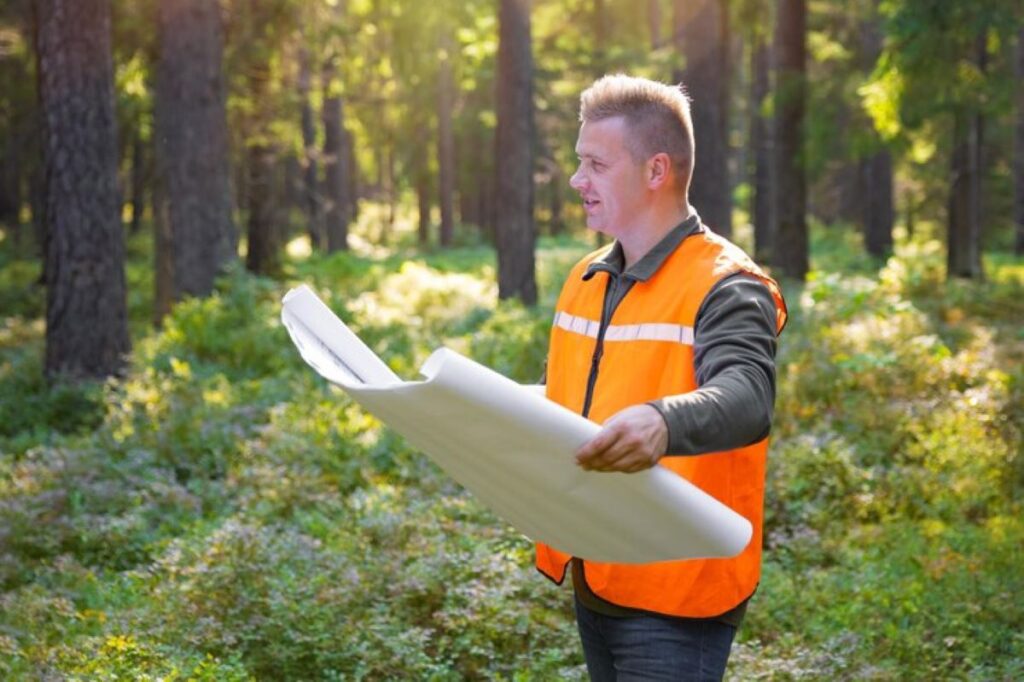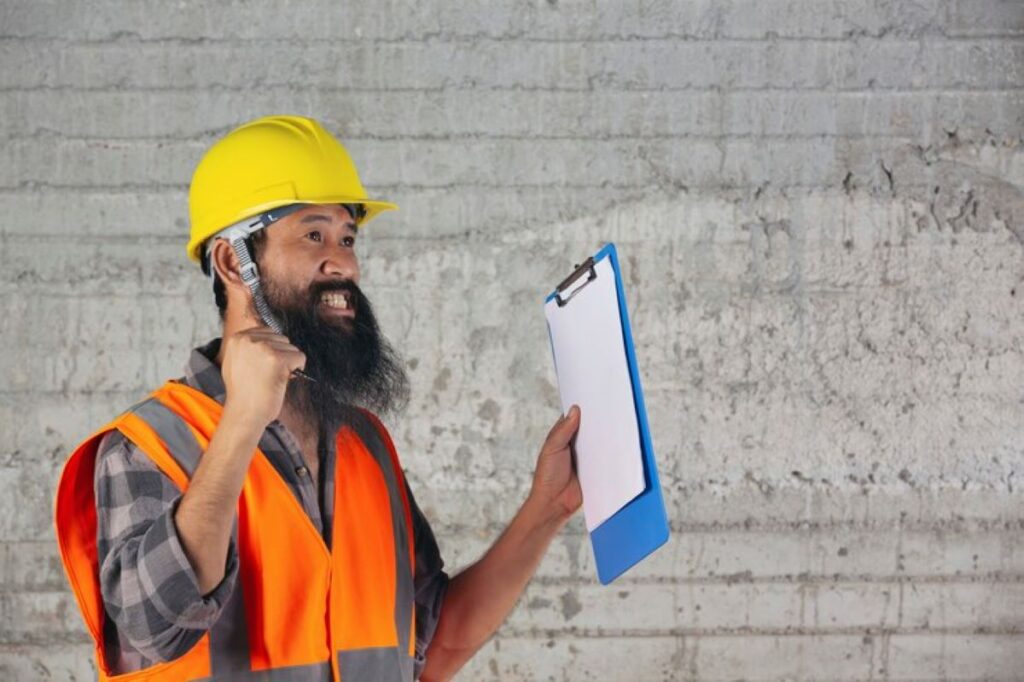
Construction surveys are essential for successful site development projects. They are specialised surveys used to gather precise spatial data and measurements of land properties.
These surveys provide detailed documentation of site conditions, boundaries, and topographical features, which are crucial for construction planning and execution.
Construction survey plays vital role in site development by:
- Establishing accurate site boundaries and elevation references
- Documenting existing site features and conditions
- Creating precise layouts for proposed structures
- Identifying potential construction challenges
- Guiding earthwork calculations and material requirements
The information obtained from construction surveys is used to make informed decisions throughout the project. This data helps architects, engineers, and contractors to:
- Design structures that fit well with the existing site conditions
- Reduce construction errors and expensive rework
- Comply with local building codes and regulations
- Stay on track with project timelines and budgets
- Achieve high-quality construction results
A comprehensive construction survey is crucial for successful site development. It turns architectural plans into reality while protecting project investments and ensuring the strength of the structure.
Key Aspects of Construction Surveys
Pre-construction surveys are crucial for successful site development projects. These thorough assessments identify potential challenges and establish important baseline data before any construction work starts.
Essential Components of Pre-Construction Surveys:
1. Topographical Mapping
Topographical mapping involves creating detailed maps that show the shape and features of the land. This includes:
- Analyzing the terrain to understand its characteristics
- Identifying natural features such as hills, rivers, or trees
- Documenting any existing structures on the site
- Assessing how water drains across the land
2. Boundary Mapping
Boundary mapping is about determining the exact limits of a property. It includes:
- Verifying where the property lines are
- Locating any easements, which are rights to use someone else’s land
- Figuring out where rights-of-way are, which allow others to pass through the property
- Understanding setback requirements, which dictate how far buildings must be from property lines
Pre-construction surveys also play a vital role in identifying underground utilities like pipes and cables, assessing soil conditions for stability, and uncovering any potential environmental issues that could affect construction plans.
By detecting these factors early on, we can avoid expensive delays and changes to designs later in the project.
The information collected from these surveys helps us plan precisely for various aspects of construction:
- Where vehicles and workers will enter and exit the site
- The best locations for placing heavy machinery during work
- Areas where materials will be stored temporarily before being used
- Specific zones designated for staging activities like assembling components or preparing equipment
- Deciding on suitable spots for setting up temporary facilities like offices or restrooms
This systematic approach to evaluating the site lays down a strong foundation for future phases of construction. It ensures that projects run smoothly, comply with regulations, and meet deadlines effectively.
Construction Staking and Compliance Verification
Construction staking serves as the physical blueprint translation on construction sites, marking critical reference points for builders and contractors. This essential process involves placing stakes or markers at specific locations to guide the placement of:
- Building corners and foundations
- Road alignments and kerb lines
- Utility installations
- Drainage systems
- Structural elements
The precision of construction staking directly impacts the accuracy of site improvements. A deviation of mere centimetres can lead to significant structural issues, making exact placement crucial for project success.
Regulatory Compliance and Standards
Construction projects must adhere to strict regulatory requirements:
- Building codes and zoning regulations
- Safety standards
- Accessibility guidelines
- Environmental protection measures
Professional surveyors, who play a key role in surveying and mapping, conduct regular verification checks throughout the construction phase to ensure:
- Structural elements align with approved plans
- Building setbacks meet local requirements
- Site grades comply with drainage specifications
- Access routes meet disability standards
These verification processes protect stakeholders from costly corrections and legal complications. The documentation generated through compliance verification also serves as valuable evidence for project approvals and future reference.
Modern staking methods incorporate digital technology and GPS systems for enhanced accuracy. These advanced tools enable real-time adjustments and precise measurements, reducing the risk of human error in site development projects.
Post-Construction Surveys: Assessing Changes and Verifying Accuracy
Post-construction surveys are important quality control measures in site development projects. These detailed assessments compare the completed construction work against the original approved plans, identifying any deviations or discrepancies that require attention.
The Survey Process
The survey process includes:
- Dimensional verification – measuring building positions, heights, and structural elements
- Grade confirmation – checking finished floor elevations and site drainage patterns
- Infrastructure placement – validating utility locations and connections
- Boundary compliance – ensuring structures respect setback requirements

Benefits of Comprehensive Post-Construction Surveys
A comprehensive post-construction survey creates an accurate record of the built environment through:
- As-built documentation for future reference
- Certification of construction accuracy
- Identification of any non-conforming elements
- Data for facility management systems
Professional surveyors use advanced measurement technologies to capture precise spatial data, creating detailed reports that support project closeout requirements and verify contractual obligations. This documentation is invaluable for facility managers, property owners, and future development planning.
Advanced Tools in Land Surveying for Detailed Data Collection
Modern construction surveying has evolved significantly with the integration of cutting-edge technology. 3D laser scanning stands at the forefront of these advancements, revolutionising data collection methods in construction projects.
3D Laser Scanning: Redefining Data Collection in Construction
3D laser scanning technology captures millions of data points per second, creating precise digital representations of physical spaces. These detailed point clouds enable:
- Accurate measurements of complex structures
- Detection of structural deformations
- Creation of as-built documentation
- Virtual site inspections
- Clash detection during design phases
Hydrographic Surveys: Mapping Underwater Landscapes
Hydrographic surveys bring specialised capabilities to waterfront construction projects. These advanced surveying techniques map underwater terrains and structures with remarkable precision, delivering:
- Detailed bathymetric data
- Underwater obstruction identification
- Sediment volume calculations
- Shoreline mapping
- Marine construction monitoring
Enhanced Accuracy with Integrated Technologies
The integration of GPS technology, robotic total stations, and digital imaging systems enhances the accuracy and efficiency of these surveying tools. Real-time data processing capabilities allow for immediate analysis and decision-making on-site.
Transforming Traditional Methods into Sophisticated Processes
These technological advancements have transformed traditional surveying methods into highly sophisticated data collection processes. The resulting datasets provide unprecedented levels of detail, supporting informed decision-making throughout the construction lifecycle and reducing potential errors in site development projects.
Benefits of Construction Surveys in Site Development Processes
Construction surveys are essential in site development as they connect architectural designs with actual construction. These surveys allow for precise interpretation of intricate design details into real, measurable buildings through:
- Spatial Accuracy: Exact positioning of building elements, ensuring structures align perfectly with design intentions
- Design Validation: Early detection of potential conflicts between design elements and existing site conditions
- Cost Management: Reduction in expensive construction errors through precise measurements and layout planning
- Quality Assurance: Continuous verification of construction progress against approved plans
The implementation of construction surveys creates a systematic approach to site development by:
- Establishing reliable reference points for construction teams
- Maintaining dimensional control throughout the building process
- Validating completed work against design specifications
- Supporting efficient resource allocation and project scheduling
Construction surveys provide the essential framework for transforming two-dimensional plans into three-dimensional structures. This process ensures each element of the construction project maintains its intended position, elevation, and relationship to other components, creating a cohesive and accurate final product.
Registered Surveyors and Utility Locators: Providing End-to-End Services for Successful Construction Projects
Registered surveyors and utility locators are crucial partners in the construction survey process, offering comprehensive services that guarantee project success. These experts bring specialised knowledge to every stage of site development:
Pre-Construction Phase Services:
- Site evaluation and existing conditions documentation
- Boundary surveys and property line verification
- Underground utility mapping and detection
- Topographic surveys for site planning
During Construction Services:
- Construction staking and layout
- As-built surveys
- Grade checking and monitoring
- Real-time positioning guidance
Quality Assurance Services:
- Compliance verification with design specifications
- Dimensional control surveys
- Settlement monitoring
- Documentation for regulatory requirements
The combination of registered surveyors and utility locators creates a strong system for precise site mapping and construction direction. This teamwork helps avoid expensive mistakes and possible dangers by locating underground utilities before digging starts. Their shared knowledge guarantees accurate placement of buildings, effective use of resources, and following safety rules throughout the project’s life.
Professional surveying teams use advanced tools and methods to provide precise information for making informed choices. Their services go beyond simple measurements to include thorough analysis and understanding of survey findings, offering valuable perspectives for project stakeholders.
See Also : How Cadastral Surveying Helps with Land Subdivision Projects
Wumara Group: Your Trusted Partner in Site Investigation Project Management and Indigenous Procurement Consulting
Wumara Group is a leading company in site investigation project management, providing comprehensive solutions throughout New South Wales and Queensland. They have expertise in various sectors, including:
- Professional Consulting ServicesSurveying
- Subsurface utility locating
- Engineering solutions
- Indigenous procurement consulting
Their dedication to excellence is evident in their work with major telecommunications providers such as CI International, Telstra, and NBN. One of their significant accomplishments includes assisting School Infrastructure NSW (SINSW) on critical state government projects.
A Unique Approach in the Construction Industry
Wumara Group stands out in the construction industry by combining technical expertise with cultural understanding. This distinctive approach offers a unique value proposition that sets them apart from competitors.
Supporting Organisations through Indigenous Procurement Consulting
Wumara Group’s Indigenous procurement consulting services are designed to assist organisations in achieving their objectives while promoting economic opportunities for Indigenous communities. Here are some key areas where they provide support:
- Develop sustainable procurement strategies
- Navigate complex tendering processes
- Build meaningful partnerships with Indigenous businesses
- Meet social responsibility objectives
Emphasising Precision, Efficiency, Innovation, and Cultural Sensitivity
In every project they undertake, Wumara Group places great importance on certain principles that guide their actions:
- Precision in site investigation
- Efficiency in resource allocation
- Innovation in technical solutions
- Cultural sensitivity in business practices
These principles not only ensure successful project outcomes but also contribute to building trust and fostering positive relationships with stakeholders.
Demonstrating Capability through Collaborations
Recent collaborations with the City of Sydney Council serve as a testament to Wumara Group’s ability to handle large-scale projects while upholding high standards of service quality and technical accuracy. By working closely with local authorities, they demonstrate their commitment to delivering results that align with community needs and aspirations.
As part of their engineering solutions, Wumara Group adheres to established guidelines such as those outlined in the US Army Corps of Engineers Engineer Manual, which provides comprehensive instructions on various engineering procedures. Additionally, their site investigation methodologies are informed by best practices similar to those detailed in the New York State Department of Environmental Conservation’s DER-10 guidance document, ensuring precision and efficiency at every stage of the project.

Positive Client Feedback and Market Reach: Establishing Trustworthiness in NSW and QLD Markets
Wumara Group’s commitment to excellence in construction surveying has earned significant recognition across New South Wales and Queensland markets. Client testimonials highlight the company’s:
- Exceptional Responsiveness: Quick turnaround times and efficient communication channels
- Professional Service Quality: Precise, accurate, and reliable surveying results
- Competitive Value: Flexible pricing structures and negotiable rates
- Technical Expertise: Comprehensive understanding of surveying requirements
Recent successful collaborations showcase Wumara Group’s diverse project portfolio:
- Telecommunications sector partnerships with:
- CI International
- City of Sydney Council
- Telstra
- NBN
- Government sector achievements:
- School Infrastructure NSW (SINSW) state projects
- Local council developments
The company’s strong presence in both NSW and QLD markets stems from its dedicated approach to client satisfaction and project delivery. Each completed project strengthens Wumara Group’s reputation as a trusted construction survey provider, demonstrated through repeat business relationships and client referrals.
This established track record of success positions Wumara Group as a reliable partner for construction survey requirements, backed by tangible results and satisfied clients across multiple sectors.